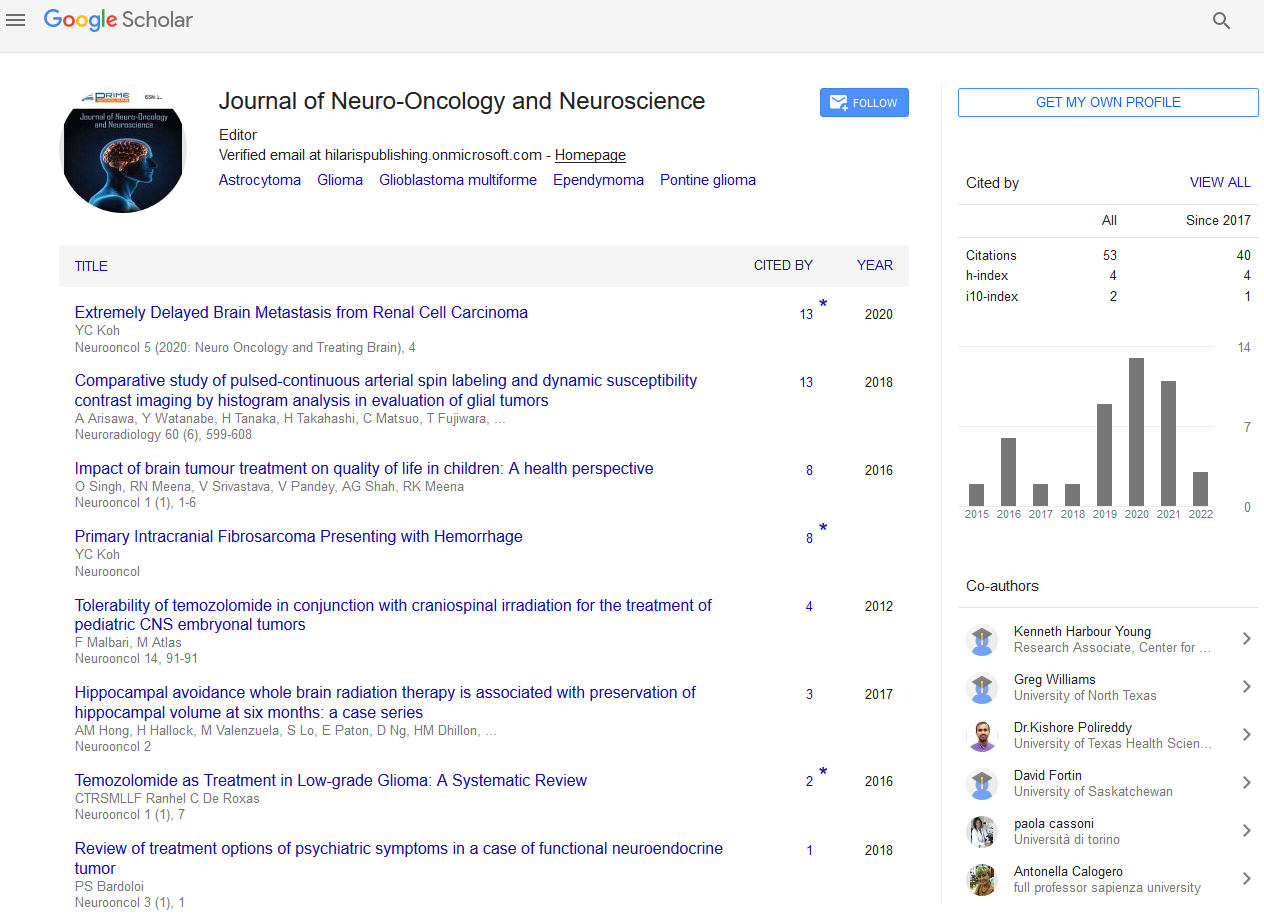Opinion - (2024) Volume 9, Issue 2
Molecular Markers and Their Role in Personalized Neuro-Oncology
James Shaffer*
Department of Sciences, University of Florence, Italy
*Correspondence:
James Shaffer,
Department of Sciences, University of Florence,
Italy,
Email:
Received: 29-May-2024, Manuscript No. IPJNO-24-20752 ;
Editor assigned: 31-May-2024, Pre QC No. IPJNO-24-20752 (PQ) ;
Reviewed: 14-Jun-2024, QC No. IPJNO-24-20752;
Revised: 19-Jun-2024, Manuscript No. IPJNO-24-20752 (R);
Published:
26-Jun-2024, DOI: 10.21767/2572-0376.9.2.18
Introduction
The landscape of neuro-oncology has been transformed by the
advent of molecular markers, ushering in an era of personalized
medicine tailored to individual patients. These markers play
a crucial role in guiding diagnosis, predicting prognosis, and
selecting targeted therapies, ultimately improving outcomes
for patients with brain tumors. Molecular markers are specific
biological indicators found within tumor cells that provide
information about their genetic, epigenetic, or proteomic
characteristics. These markers include mutations, gene
amplifications, deletions, rearrangements, and alterations in
gene expression patterns. Each marker can offer unique insights
into tumor behavior and response to treatment. Mutations in
isocitrate dehydrogenase genes are frequently observed in
gliomas and other brain tumors. IDH mutations are not only
diagnostic markers but also prognostic indicators associated
with better outcomes in certain tumor subtypes. Methylation
of the MGMT promoter predicts responsiveness to alkylating
agents like temozolomide in glioblastoma patients.
Description
Amplification and mutation of the epidermal growth factor
receptor are common in glioblastomas and can influence
treatment decisions, including the use of EGFR-targeted
therapies. Molecular markers enable the identification of specific
therapeutic targets within tumors, facilitating the development
and implementation of targeted therapies. Drugs like imatinib
target specific kinase mutations such as PDGFR mutations in
gliomas, improving outcomes by selectively inhibiting tumor
cell growth pathways. Biomarkers like PD-L1 expression can
guide the use of immune checkpoint inhibitors in brain tumors,
enhancing the immune system’s ability to recognize and attack
tumor cells. Molecular markers associated with angiogenesis,
such as VEGF overexpression, inform the use of anti-angiogenic
therapies to block tumor blood vessel formation and growth.
Tumors often exhibit genetic heterogeneity, requiring
comprehensive profiling of multiple molecular markers to
capture the full spectrum of tumor characteristics. Tumor
cells can develop resistance to targeted therapies over time,
necessitating ongoing monitoring and adaptation of treatment
strategies based on evolving molecular profiles. Molecular
testing can be costly and may not be universally accessible,
limiting its widespread application in resource-constrained
settings. Recent advancements in genomic, transcriptomic,
proteomic, and metabolomic technologies have expanded
the repertoire of molecular markers in neuro-oncology. These
omics approaches enable comprehensive profiling of tumors,
identifying novel biomarkers and molecular signatures that
could further refine personalized treatment strategies. These
markers include mutations, gene amplifications, deletions,
rearrangements, and alterations in gene expression patterns.
Each marker can offer unique insights into tumor behavior and
response to treatment. Mutations in isocitrate dehydrogenase
genes are frequently observed in gliomas and other brain
tumors.
Conclusion
Molecular markers are integral to the paradigm shift towards
personalized neuro-oncology, offering insights into tumor
biology and guiding treatment decisions tailored to individual
patients. As our understanding of molecular pathways deepens
and technology continues to evolve, the incorporation of
molecular markers into clinical practice promises to further
enhance therapeutic outcomes and improve the quality
of life for patients battling brain tumors. Embracing these
advancements will be essential in realizing the full potential of
precision medicine in neuro-oncology. These markers include
mutations, gene amplifications, deletions, rearrangements,
and alterations in gene expression patterns. Each marker can
offer unique insights into tumor behavior and response to
treatment. Mutations in isocitrate dehydrogenase genes are
frequently observed in gliomas and other brain tumors.
Citation: Shaffer J (2024) Molecular Markers and their Role in Personalized Neuro-Oncology. Neurooncol. 9:18.
Copyright: © 2024 Shaffer J. This is an open-access article distributed under the terms of the Creative Commons Attribution License, which permits unrestricted use, distribution, and reproduction in any medium, provided the original author and source are credited.

